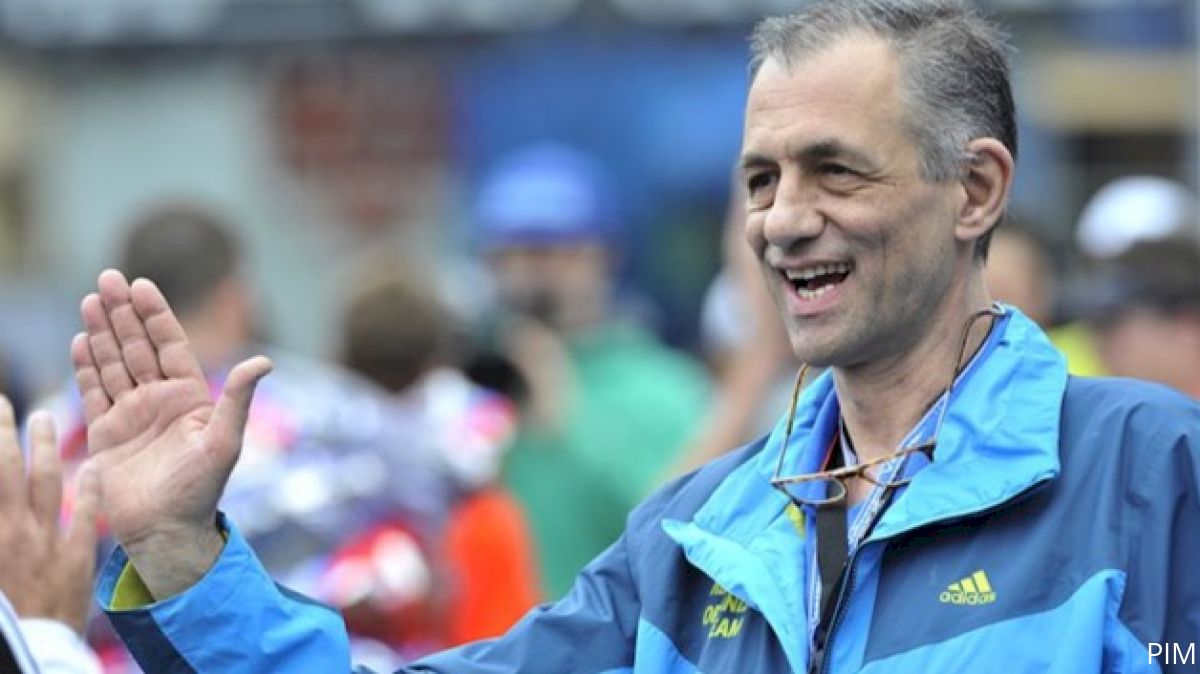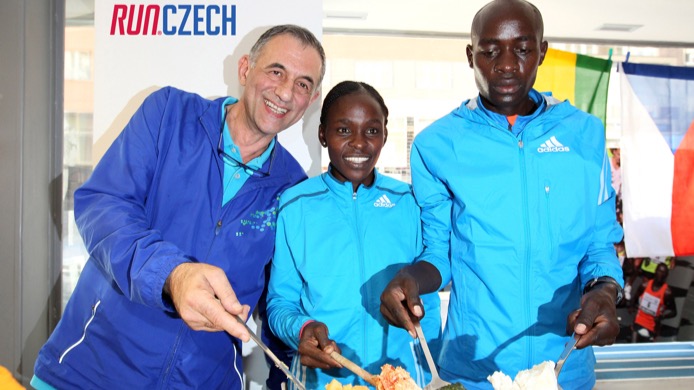2016 Volkswagen Prague MarathonMay 6, 2016 by Joe Battaglia
New IAAF Road Racing Chair: We Need To Restore Trust, Create Heroes
New IAAF Road Racing Chair: We Need To Restore Trust, Create Heroes
In an exclusive interview with FloTrack, new IAAF Road Racing Commission chairman Carlo Capalbo talked about the challenges he faces in shaping the future of the sport.

PRAGUE – Over a round of beers in 1994, Carlo Capalbo, with the help of his friend Galindo Bordin and great Olympian Emil Zatopek, winner of the 5000m, 10,000m and marathon gold medals at the 1952 Helsinki Games, brainstormed the first Prague Marathon. Approximately 980 runners competed that first year. In the 22 years since, Capalbo has seen the race develop into one of the best in the world and has created six more races around the Czech Republic. Last year 77,000 participated in the Run Czech Running League.
Last month the 59-year-old received perhaps the highest recognition for his innovation as he was appointed chairman of the IAAF Road Racing Commission, a high honor for a race organizer outside of the World Marathon Majors. In an exclusive interview with FloTrack, Capalbo shared his thoughts on being entrusted with shaping the future of the sport in perhaps the most trying times in its history.
What does the appointment to chair the IAAF Road Racing Commission mean to you personally?
I am honored to have been appointed and, of course, it's a great privilege. At the same time, it's a lot of work because our sport is going through some tough times in terms of integrity and we need to stop this immediately because if we lose the trust of our runners, indeed we lose the sport. That would be my first task, which I will work together with the excellent people, the other members of the commission. As well during the course of this mandate, we will try to get the sport closer to people.
Doping and pockets of the world without reliable testing are major issues. What challenges does the IAAF face in closing those gaps?
To be concrete, one of the first things we are going to do or we are going to propose to the council is maybe to create an independent (testing) center in East Africa. Second, thinking as well to a lot people around the world including Jim Estes, the head of (road racing) at USA Track and Field, is that we need to make sure that the runners, the elites which run in a federation-certified race or a (IAAF) label race, are clean. It's easier with the big races, it's more difficult for the small races for question of resources. Most of the races they can't afford. One of the ideas, which is not definitive, coming from the U.S., is that in every race the first man and the first woman needs to be checked, which today that hasn't happened.
My mom told me something, 'Carlo, there is no difference between a simple lie and a much bigger crime.' People that lie, people that cheat, they should first of all give back what they received as a prize for their performance, which has not happened, and second, I think they should not be part anymore of our sport. Indeed, we are going after this matter at RunCzech and not only as a commission. We will never accept any more people that had a suspension longer than six months.
Truly, how big of a problem is doping in East Africa?
When you have one, two, or three cases, people tend to generalize and that is the danger. I know, personally, a lot of athletes and after seeing them in Kenya and Ethiopia I can guarantee that most of them, the very big majority of them, they are clean and they love the sport and they are the first one that want to have a clean sport because they live on this sport.

What are the challenges to getting independent testing up and running in East Africa?
The challenges are first of all the financial resources and World Marathon Majors have already devoted something to that. The World Marathon Majors are not only the largest, but the leading events in the world. They already started this kind of movement against doping and for clean sport. But, I think the main difficulty is to find an independent lab in East Africa which has nothing to do with the federation itself and has nothing to do with the government because a sport East Africa is a big part of the GNP.
How can you make the sport more accessible to young people from a road running standpoint?
Lord Coe told me last week, 'Carlo, when I was competing there was World Championships and people would easily spend all the afternoon or the evening in front of the TV. Now, it's not the case anymore.’ He's right. When he was competing he was one of my heroes. The key and the answer is in this small word: hero. We do not have our recognizable heroes. We do not have people to support. We do not have any more national champions because in East Africa they are so good that indeed there is no competition with the European athletes, North American athletes, or Asian athletes. There is very little competition let's say. I think the secret is to create our own heroes.
We have some initiatives through the rules of the (IAAF) Gold Label system which could help this tendency, it could help rebalance a little bit, but on the other side this is a sport and so the best must win. I do believe that the federations should think a bit more about road running and I see that people go to train in Iten or Eldoret and so on. Why not create a good, efficient training center in Europe? I'm talking about Europe, the same is valid of course in the States, where we could train our athletes, our heroes here and make them compete with East Africa. With the help of the federations, having more training infrastructure and with the help of the people themselves, I think we can rebalance the situation.
The Prague Marathon will be live-streamed and archived on FloTrack Sunday April 8.
Watch the Volkswagen Prague Marathon LIVE on FloTrack Sunday!
Last month the 59-year-old received perhaps the highest recognition for his innovation as he was appointed chairman of the IAAF Road Racing Commission, a high honor for a race organizer outside of the World Marathon Majors. In an exclusive interview with FloTrack, Capalbo shared his thoughts on being entrusted with shaping the future of the sport in perhaps the most trying times in its history.
What does the appointment to chair the IAAF Road Racing Commission mean to you personally?
I am honored to have been appointed and, of course, it's a great privilege. At the same time, it's a lot of work because our sport is going through some tough times in terms of integrity and we need to stop this immediately because if we lose the trust of our runners, indeed we lose the sport. That would be my first task, which I will work together with the excellent people, the other members of the commission. As well during the course of this mandate, we will try to get the sport closer to people.
Doping and pockets of the world without reliable testing are major issues. What challenges does the IAAF face in closing those gaps?
To be concrete, one of the first things we are going to do or we are going to propose to the council is maybe to create an independent (testing) center in East Africa. Second, thinking as well to a lot people around the world including Jim Estes, the head of (road racing) at USA Track and Field, is that we need to make sure that the runners, the elites which run in a federation-certified race or a (IAAF) label race, are clean. It's easier with the big races, it's more difficult for the small races for question of resources. Most of the races they can't afford. One of the ideas, which is not definitive, coming from the U.S., is that in every race the first man and the first woman needs to be checked, which today that hasn't happened.
My mom told me something, 'Carlo, there is no difference between a simple lie and a much bigger crime.' People that lie, people that cheat, they should first of all give back what they received as a prize for their performance, which has not happened, and second, I think they should not be part anymore of our sport. Indeed, we are going after this matter at RunCzech and not only as a commission. We will never accept any more people that had a suspension longer than six months.
Truly, how big of a problem is doping in East Africa?
When you have one, two, or three cases, people tend to generalize and that is the danger. I know, personally, a lot of athletes and after seeing them in Kenya and Ethiopia I can guarantee that most of them, the very big majority of them, they are clean and they love the sport and they are the first one that want to have a clean sport because they live on this sport.

What are the challenges to getting independent testing up and running in East Africa?
The challenges are first of all the financial resources and World Marathon Majors have already devoted something to that. The World Marathon Majors are not only the largest, but the leading events in the world. They already started this kind of movement against doping and for clean sport. But, I think the main difficulty is to find an independent lab in East Africa which has nothing to do with the federation itself and has nothing to do with the government because a sport East Africa is a big part of the GNP.
How can you make the sport more accessible to young people from a road running standpoint?
Lord Coe told me last week, 'Carlo, when I was competing there was World Championships and people would easily spend all the afternoon or the evening in front of the TV. Now, it's not the case anymore.’ He's right. When he was competing he was one of my heroes. The key and the answer is in this small word: hero. We do not have our recognizable heroes. We do not have people to support. We do not have any more national champions because in East Africa they are so good that indeed there is no competition with the European athletes, North American athletes, or Asian athletes. There is very little competition let's say. I think the secret is to create our own heroes.
We have some initiatives through the rules of the (IAAF) Gold Label system which could help this tendency, it could help rebalance a little bit, but on the other side this is a sport and so the best must win. I do believe that the federations should think a bit more about road running and I see that people go to train in Iten or Eldoret and so on. Why not create a good, efficient training center in Europe? I'm talking about Europe, the same is valid of course in the States, where we could train our athletes, our heroes here and make them compete with East Africa. With the help of the federations, having more training infrastructure and with the help of the people themselves, I think we can rebalance the situation.
The Prague Marathon will be live-streamed and archived on FloTrack Sunday April 8.